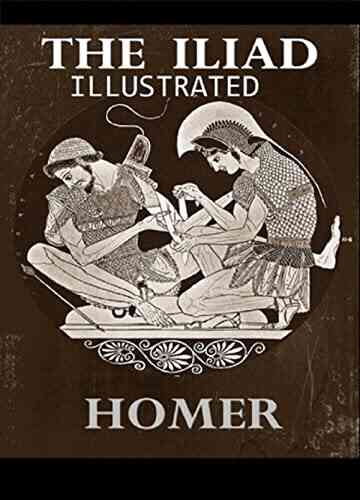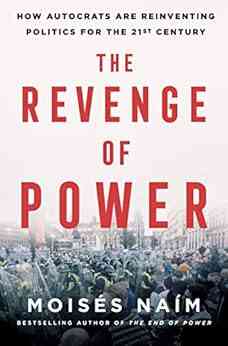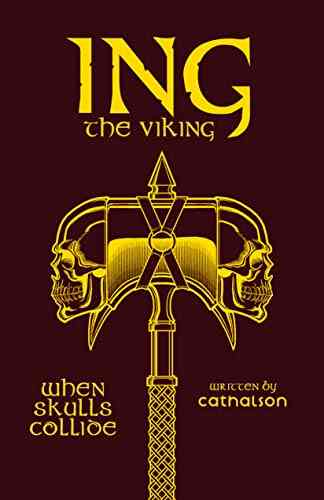The Revenge Of Power: Unveiling the Dark Side of Authority

Have you ever felt oppressed by those in power? Whether it's a manipulative boss, a corrupt politician, or an authoritarian ruler, the abuse of authority has been a recurring theme throughout history. In this article, we will delve into the concept of power and its potential for revenge.
Power, in its essence, is the ability to influence or control others. It can be found in various forms, such as political power, economic power, or social power. When power is wielded responsibly, it can pave the way for progress and positive change. However, when it falls into the wrong hands, it can become a destructive force.
Throughout history, countless examples of power's dark side have emerged. From pharaohs of ancient Egypt to modern-day tyrants, those in power have often used their authority to dominate and oppress others. This abuse of power can manifest in various ways, including political corruption, human rights violations, and economic exploitation.
4.3 out of 5
| Language | : | English |
| File size | : | 2143 KB |
| Text-to-Speech | : | Enabled |
| Screen Reader | : | Supported |
| Enhanced typesetting | : | Enabled |
| Word Wise | : | Enabled |
| Print length | : | 309 pages |
The Rise and Fall of Power
Power has a tendency to corrupt, and absolute power corrupts absolutely. This idea, coined by British politician Lord Acton in the 19th century, highlights the dangerous nature of unrestrained authority. When individuals are given unchecked power, they often succumb to their own desires and lose sight of their responsibility to those they govern.
History is littered with examples of despotic rulers who let power consume them. From Roman emperors like Caligula and Nero to dictators like Adolf Hitler and Joseph Stalin, the thirst for power drove these individuals to commit heinous acts that scarred the world. Their reigns serve as cautionary tales, reminding us of the potential consequences of unchecked authority.
However, power doesn't only exist on a grand scale. It can also be found in everyday situations. Think of workplace bullying, where bosses abuse their power to intimidate and belittle their subordinates. Or consider cases of police brutality, where individuals in positions of authority misuse their power to inflict harm on vulnerable communities.
The Vengeful Nature of Power
When power is abused and individuals are oppressed, a natural desire for revenge begins to simmer. Oppressed individuals may start to harbor feelings of anger and resentment towards those in power, seeking retribution for the injustices they have endured.
Over time, this desire for revenge can lead to uprisings, revolutions, or even acts of terrorism. When people feel that they have no other means to confront their oppressors, they turn to extreme measures in the pursuit of justice. It is crucial to understand that revenge is often a consequence of unchecked power and a lack of avenues for redress.
In recent years, we have witnessed numerous instances of people rising up against oppressive regimes or institutions. From the Arab Spring movement in the Middle East to the Black Lives Matter movement fighting against systemic racism, these protests highlight the deep-rooted desire for justice and the need to challenge those who misuse their power.
A Path Towards Restorative Power
Power doesn't always have to be destructive. There is a growing movement towards restorative power, where authority is utilized in a way that promotes equality, fairness, and justice. This form of power seeks to empower individuals rather than oppress them, recognizing that true progress can only be achieved through collaboration and inclusivity.
Restorative power focuses on dismantling systems of oppression and creating spaces where individuals are respected and heard. It involves cultivating empathy, accountability, and transparency within the structures of power, ensuring that those in authority remain connected to the needs and aspirations of the people they serve.
We must strive for a world where power is no longer synonymous with domination and control but is instead aligned with compassion and responsibility. By holding those in power accountable and promoting restorative practices, we can work towards a future where revenge is no longer necessary.
The revenge of power has plagued societies for centuries. From despotic rulers to workplace bullies, the misuse of authority has caused immense suffering. However, it is through recognizing the vengeful nature of power and striving for restorative practices that we can break this cycle.
By understanding the dangers of unchecked authority and supporting movements for justice and equality, we can create a world where power is wielded responsibly and revenge is replaced by reconciliation. Let us work towards a future where The Revenge Of Power is no longer a chapter in our history books but a testament to the triumph of justice over oppression.
4.3 out of 5
| Language | : | English |
| File size | : | 2143 KB |
| Text-to-Speech | : | Enabled |
| Screen Reader | : | Supported |
| Enhanced typesetting | : | Enabled |
| Word Wise | : | Enabled |
| Print length | : | 309 pages |
“An authoritative and intelligent portrait of the global spread of authoritarianism and its dangers...what sets [this] work apart from books like Timothy Snyder’s On Tyranny and Michiko Kakutani’s The Death of Truth is its unusually comprehensive armada of facts about the international drift over the past two decades toward authoritarian leaders, whether old-style dictators like Kim Jong Un or nominally elected presidents like Vladimir Putin.” —Kirkus
An urgent, thrilling, and original look at the future of democracy that illuminates one of the most important battles of our time: the future of freedom and how to contain and defeat the autocrats mushrooming around the world.
In his bestselling book The End of Power, Moisés Naím examined power-diluting forces. In The Revenge of Power, Naím turns to the trends, conditions, technologies and behaviors that are contributing to the concentration of power, and to the clash between those forces that weaken power and those that strengthen it. He concentrates on the three “P”s—populism, polarization, and post-truths. All of which are as old as time, but are combined by today’s autocrats to undermine democratic life in new and frightening ways. Power has not changed. But the way people go about gaining it and using it has been transformed.
The Revenge of Power is packed with alluring characters, riveting stories about power grabs and loses, and vivid examples of the tricks and tactics used by autocrats to counter the forces that are weakening their power. It connects the dots between global events and political tactics that, when taken together, show a profound and often stealthy transformation in power and politics worldwide. Using the best available data and insights taken from recent research in the social sciences, Naím reveals how, on close examination, the same set of strategies to consolidate power pop up again and again in places with vastly different political, economic, and social circumstances, and offers insights about what can be done to ensure that freedom and democracy prevail.
The outcomes of these battles for power will determine if our future will be more autocratic or more democratic. Naím addresses the questions at the heart of the matter: Why is power concentrating in some places while in others it is fragmenting and degrading? And the big question: What is the future of freedom?
Do you want to contribute by writing guest posts on this blog?
Please contact us and send us a resume of previous articles that you have written.




















Light bulbAdvertise smarter! Our strategic ad space ensures maximum exposure. Reserve your spot today!

 Walter SimmonsThe Mermaid Virus Strikes Micro Mini Romance: Unraveling the Mysterious Love...
Walter SimmonsThe Mermaid Virus Strikes Micro Mini Romance: Unraveling the Mysterious Love...
 William PowellThe Unforgettable So Not My Thing Romantic Comedy That Will Make Your Heart...
William PowellThe Unforgettable So Not My Thing Romantic Comedy That Will Make Your Heart...
 F. Scott FitzgeraldThe Iliad of Homer Illustrated Edition: A Timeless Epic That Continues to...
F. Scott FitzgeraldThe Iliad of Homer Illustrated Edition: A Timeless Epic That Continues to... Emmett MitchellFollow ·17.1k
Emmett MitchellFollow ·17.1k Branson CarterFollow ·9.6k
Branson CarterFollow ·9.6k Dean CoxFollow ·2.4k
Dean CoxFollow ·2.4k Gabriel Garcia MarquezFollow ·16.6k
Gabriel Garcia MarquezFollow ·16.6k Henry Wadsworth LongfellowFollow ·19.7k
Henry Wadsworth LongfellowFollow ·19.7k Jay SimmonsFollow ·9.4k
Jay SimmonsFollow ·9.4k Cade SimmonsFollow ·17.4k
Cade SimmonsFollow ·17.4k Craig CarterFollow ·6.3k
Craig CarterFollow ·6.3k

 Fletcher Mitchell
Fletcher MitchellPoems About Lovers, Family, Friends And Home -...
Poetry has always been a powerful...

 Darius Cox
Darius CoxThe Friendship Poems Of Rumi: Discover the Timeless...
Friendship is a sacred bond that...

 Gordon Cox
Gordon CoxLet Go Of Who You Think You're Supposed To Be And Embrace...
Have you ever felt like you were living a...

 Truman Capote
Truman CapoteTreasure Of Pearls Celebrating Life Lived In Poetry:...
Life is a wondrous journey, filled with...

 Jaime Mitchell
Jaime MitchellThe World Of Otome Games Is Tough For Mobs: An Epic...
Welcome to the magnificent realm of...

 Jules Verne
Jules VerneMiss You My Darling - The Powerful Emotions of Longing
Do you ever find yourself longing for...

 F. Scott Fitzgerald
F. Scott FitzgeraldThe Iliad of Homer Illustrated Edition: A Timeless Epic...
The Iliad of Homer is a captivating tale...

 Gene Powell
Gene PowellWho Would Search For Pearls Must Dive Below
The Ultimate...

 Bret Mitchell
Bret MitchellHow To Create Animated And Professional Videos Using...
Apple Keynote is not just limited to...

 Caleb Long
Caleb LongThe Incredible World of Aromatic Herbs: Unveiling their...
Are you looking to add a burst of flavor...

 Charlie Scott
Charlie ScottCry Baby Mystic Free Verse Editions: Embracing Emotions...
Poetry has long been a means of...

 Kendall Ward
Kendall WardThe Ultimate Action Guide For Resolving Conflict: Expert...
Conflict is an inevitable part...
4.3 out of 5
| Language | : | English |
| File size | : | 2143 KB |
| Text-to-Speech | : | Enabled |
| Screen Reader | : | Supported |
| Enhanced typesetting | : | Enabled |
| Word Wise | : | Enabled |
| Print length | : | 309 pages |
















